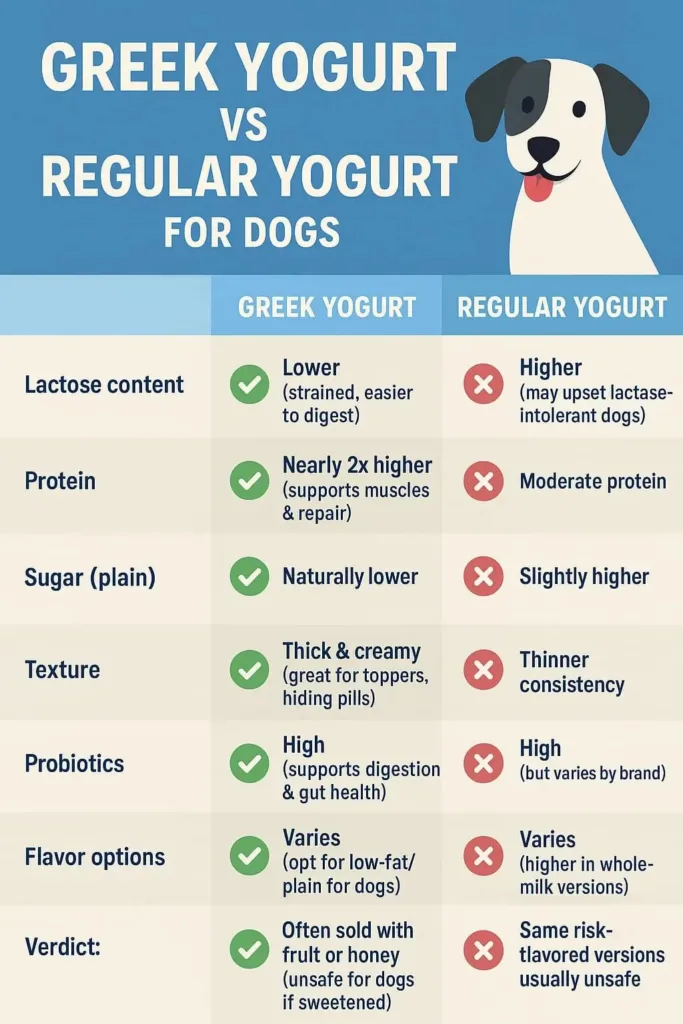As pet parents, we often look at our food and wonder if it’s safe to share with our dogs. Yogurt is a common item that sparks curiosity — some owners swear by its digestive benefits, while others worry about lactose intolerance. But what about Greek yogurt specifically?
The good news is that dogs can eat plain, unsweetened Greek yogurt in moderation. In fact, Greek yogurt can often be a healthier choice than regular yogurt because it contains less lactose and more protein. However, not all Greek yogurt products are safe — flavored varieties or those with artificial sweeteners (like xylitol) can be dangerous and should be avoided.
This in-depth guide explores the nutritional profile of Greek yogurt, its benefits and risks for dogs, how much is safe to feed, and the best ways to serve it.
What Makes Greek Yogurt Different from Regular Yogurt?

Greek yogurt is made by straining regular yogurt to remove most of the liquid whey. This process gives it a creamier texture and changes its nutritional profile in several ways:
- Lower lactose content: Easier for lactose-sensitive dogs to digest.
- Higher protein levels: Nearly double the protein of regular yogurt.
- Less sugar: Plain Greek yogurt naturally contains fewer sugars.
- Thicker consistency: Makes it useful for disguising medication or topping meals.
Because of these differences, Greek yogurt is often a better option for dogs than standard yogurt.
Benefits of Greek Yogurt for Dogs
When offered in moderation, plain Greek yogurt provides several nutritional and functional benefits for dogs.
1. Digestive Health Through Probiotics
Greek yogurt contains probiotics — live bacteria that help maintain a balanced gut microbiome. These healthy bacteria can:
- Aid digestion and nutrient absorption.
- Help manage mild diarrhea or stomach upset.
- Restore healthy gut flora after antibiotics.
This makes Greek yogurt especially valuable for dogs with occasional digestive troubles.
2. High-Quality Protein for Muscles and Energy
Dogs need protein to build muscle, repair tissue, and maintain energy levels. Greek yogurt provides nearly twice the protein of regular yogurt, which is particularly helpful for active breeds, working dogs, or pups recovering from illness or injury.
3. Stronger Bones and Teeth
Greek yogurt is an excellent source of calcium and phosphorus, both of which are critical for bone strength and dental health. Puppies benefit from these nutrients during growth, while senior dogs need them to help prevent bone loss.
4. Immune System Boost
Greek yogurt provides key micronutrients like zinc, potassium, and B vitamins. Zinc supports skin and coat health, while B vitamins help with energy production and nerve function. Combined with probiotics, these nutrients support a stronger immune system.
5. A Healthy, Low-Calorie Treat Option
Instead of high-fat biscuits or processed treats, a spoonful of Greek yogurt is a low-calorie alternative. With about 20–30 calories per tablespoon, it can be used as a refreshing treat without risking weight gain.
6. Helps with Medication and Picky Eating
Many owners struggle to give dogs pills or powders. The creamy texture of Greek yogurt can disguise medication, making the process easier. It’s also useful for picky eaters who might ignore kibble but will happily eat it when topped with a spoonful of yogurt.
Risks and Concerns of Feeding Greek Yogurt to Dogs
While Greek yogurt has clear benefits, it also comes with risks if given incorrectly.
1. Lactose Intolerance
Even though Greek yogurt contains less lactose than regular yogurt, it isn’t lactose-free. Dogs with lactose intolerance may still experience bloating, gas, diarrhea, or vomiting. Puppies and seniors are more sensitive.
2. Added Sugars and Flavored Varieties
Flavored Greek yogurts (strawberry, vanilla, honey, etc.) usually contain large amounts of sugar and preservatives. Excess sugar can lead to obesity, diabetes, and dental problems in dogs.
3. Toxic Artificial Sweeteners
Some Greek yogurts, especially “light” or “sugar-free” varieties, contain xylitol. Xylitol is extremely toxic to dogs — even tiny amounts can cause hypoglycemia, seizures, liver failure, or death. Always read labels carefully.
4. High Fat Content in Some Varieties
Full-fat Greek yogurt is safe in small amounts but can contribute to weight gain or even pancreatitis in sensitive breeds. Low-fat or non-fat plain versions are safer options.
5. Risk of Overfeeding
Because yogurt is tasty, dogs may quickly develop a liking for it. Overfeeding Greek yogurt can disrupt their regular diet and lead to digestive upset or weight gain. Treats like yogurt should never make up more than 10% of a dog’s daily calories.
How Much Greek Yogurt Can Dogs Eat?
Moderation is essential. Here’s a safe guideline for feeding Greek yogurt to dogs:
- Small dogs (<20 lbs): 1 to 2 teaspoons.
- Medium dogs (20–50 lbs): 1 to 2 tablespoons.
- Large dogs (>50 lbs): 2 to 3 tablespoons.
Offer it only a few times per week, not daily. Always start with small amounts to monitor your dog’s tolerance.
Safe Ways to Feed Greek Yogurt to Dogs

There are plenty of creative, safe ways to incorporate Greek yogurt into your dog’s diet:
- Frozen yogurt bites: Mix yogurt with dog-safe fruits (like blueberries or strawberries) and freeze in ice cube trays.
- Kibble topper: Add a spoonful to dry food to enhance flavor and nutrition.
- Training treat: Offer small licks as low-calorie rewards.
- Pill disguise: Coat pills in yogurt to make medication easier to administer.
Always serve plain, unsweetened, and unflavored Greek yogurt.
Alternatives to Greek Yogurt
If your dog cannot tolerate Greek yogurt, try these alternatives:
- Kefir: A fermented milk drink with more probiotics and less lactose.
- Goat’s milk: Easier to digest than cow’s milk, though still not for all dogs.
- Pumpkin puree: High in fiber, supports digestion, and is completely dairy-free.
- Dog-specific probiotics: Veterinary-approved supplements designed for dogs.
What to Do If Your Dog Reacts Badly
If your dog develops diarrhea, vomiting, or bloating after eating Greek yogurt, stop giving it immediately. Offer fresh water and a bland diet (boiled chicken and rice) until symptoms resolve.
If your dog accidentally eats Greek yogurt with xylitol or another toxic ingredient, seek emergency veterinary care right away.
Expert Opinions and Common Myths
Veterinary experts generally agree that plain, unsweetened Greek yogurt is safe in moderation. However, it should not replace a balanced diet or clinical probiotics when needed.
Common Myths:
- “All dogs can eat yogurt safely.” False — lactose intolerance varies by dog.
- “Yogurt alone cures digestive problems.” False — it may help mild cases but isn’t a replacement for veterinary treatment.
- “Flavored yogurt is safe if fruit-based.” False — most still contain added sugars or harmful additives.
Conclusion
So, can dogs eat Greek yogurt? Yes — as long as it’s plain, unsweetened, and offered in moderation. Greek yogurt is packed with probiotics, protein, and calcium, making it a nutritious occasional treat.
However, risks like lactose intolerance, high fat, or toxic sweeteners mean you must be cautious. Stick to plain varieties, start small, and always watch for digestive upset.
When used wisely, Greek yogurt can be a safe and healthy way to give your dog a little extra nutrition.
Frequently Asked Questions (FAQ)
Is Greek yogurt better for dogs than regular yogurt?
Yes. Greek yogurt has less lactose and more protein, making it easier to digest and more nutritious.
Can puppies eat Greek yogurt?
Not recommended unless approved by a vet. Puppies have sensitive stomachs and may react poorly to dairy.
How much Greek yogurt can I give my dog?
Small dogs: 1–2 teaspoons. Medium dogs: 1–2 tablespoons. Large dogs: up to 3 tablespoons, only a few times per week.
Can Greek yogurt help with diarrhea?
The probiotics may help mild cases, but persistent diarrhea needs veterinary attention.
Is flavored Greek yogurt safe for dogs?
No. Flavored yogurts usually contain sugars, preservatives, or xylitol, which is toxic to dogs.
Can lactose-intolerant dogs eat Greek yogurt?
Some may tolerate it better than milk due to reduced lactose, but many still react poorly. Always test in small amounts.

